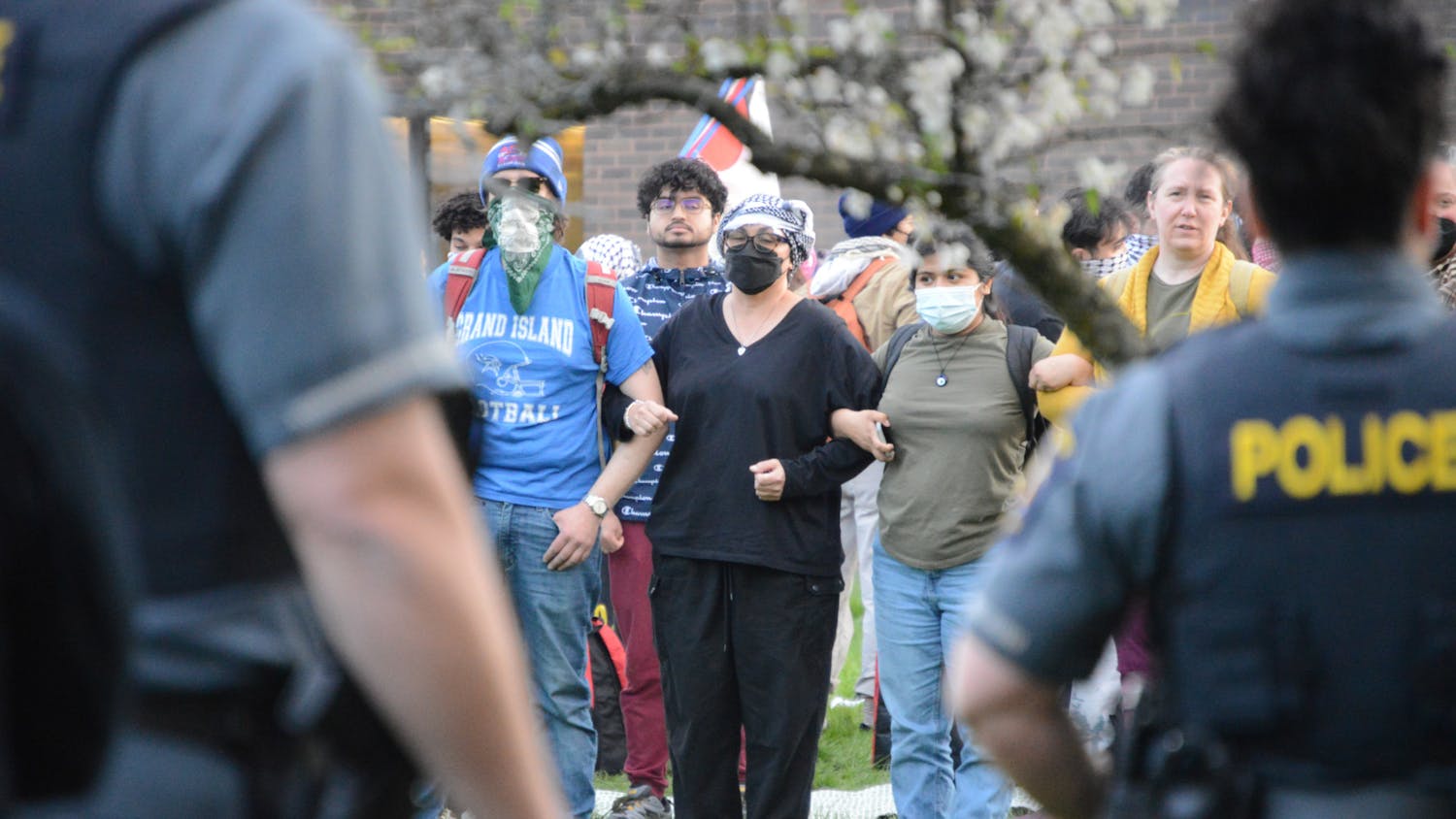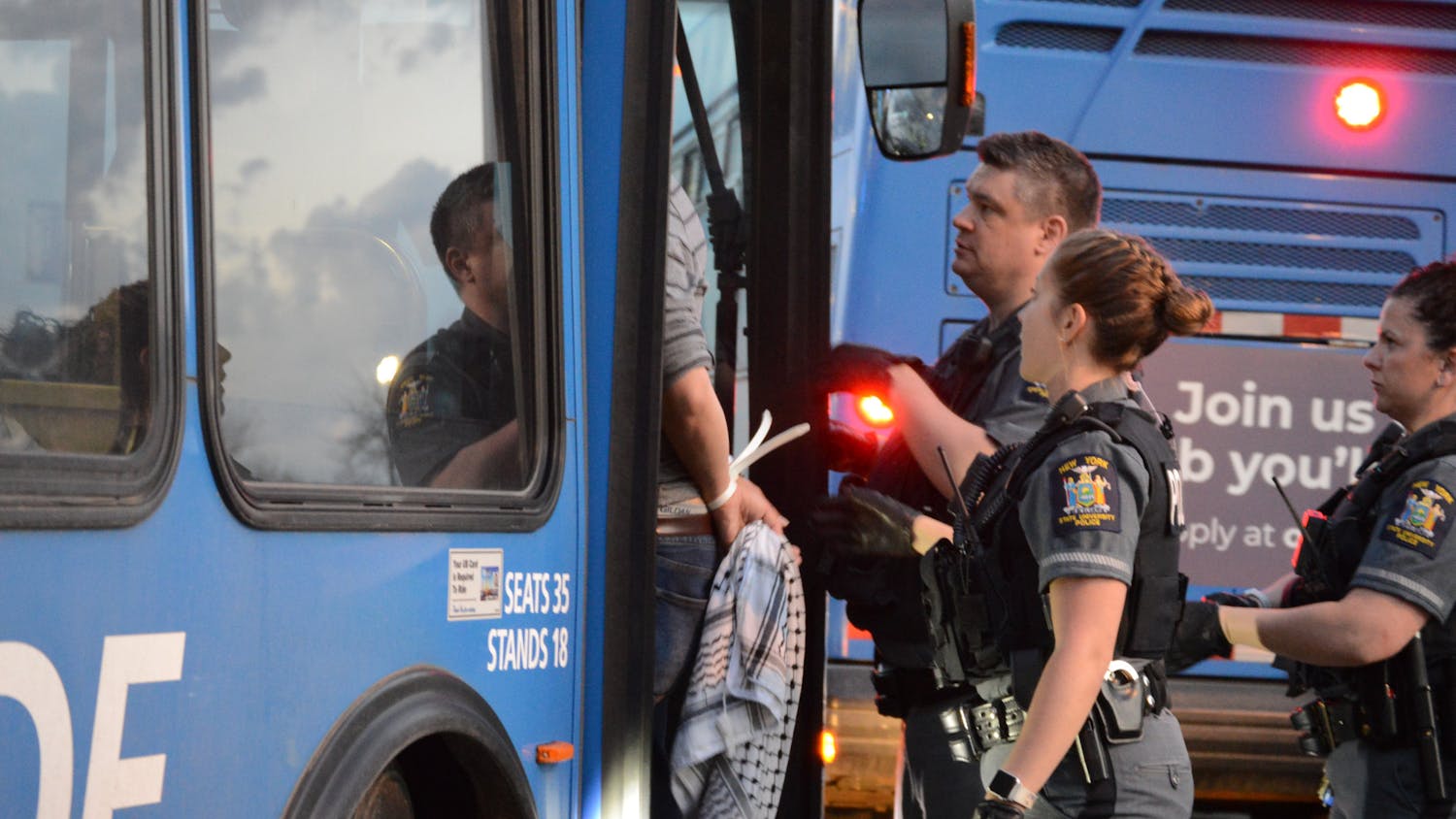The Student Association suspended the Intervarsity Christian Fellowship until further notice on Friday, and two days later, the SA Senate created an investigative committee to determine whether the club is in violation of the law and university policy by requiring its executive board members to sign a faith-based agreement.
The suspension came after The Spectrum reported that sophomore history and French major Steven Jackson felt pressured to resign as treasurer of the Intervarsity Christian Fellowship (IVCF) – a national, student-led, evangelical ministry with a UB chapter – because his homosexuality didn't sit well with the group's executive board and staff.
"All peripheral privileges afforded to Student Association clubs are revoked for Intervarsity Christian Fellowship until further notice," wrote SA Treasurer Sikander Khan in a Friday letter to the IVCF's executive board.
The SA Senate decided on Sunday afternoon not to lift the suspension after a plea from Jackson himself on behalf of the club. (Jackson is also the speaker of the SA Assembly.) Jackson is still a member of the club, and he attended a club event on Friday night.
Travis Nemmer, acting as an SA senator by proxy, read a prepared statement from Jackson to those assembled in a Knox lecture hall for the meeting, which had unusually high attendance due to the IVCF issue. Many IVCF members were present, as well as numerous other concerned students from the LGBT community and other groups.
"I believe the article in Friday's Spectrum was wholly accurate," Jackson's statement read. "Had my [sexual] orientation not come up, I do not believe that this would be happening right now...If [the IVCF's requirement to sign a faith-based agreement] is illegal, I do not blame Intervarsity. I blame the Student Association for failing to properly review club constitutions and inform clubs of their legality."
Later in his statement, Jackson asked the Senate to lift the suspension.
"I understand that [IVCF] is currently suspended, which means we cannot do events that we were promised space for as an SA club...My plea to the Senate: do not punish the majority, the general membership, for an unfortunate mistake [pressuring me to resign] by a minority, the executive board," Jackson's statement read.
The Senate, though, did not lift the suspension, instead choosing to leave that decision to the SA's executive board, which suspended IVCF in the first place. As a result, the IVCF will miss a club event scheduled for Tuesday, unless the SA executive board decides to lift the suspension before then, which is unlikely.
Legal or Illegal?
The Senate investigative committee was created Sunday to gather information this week and recommend to the Senate at next week's meeting (this coming Sunday at 3 p.m., room to be announced) what action it should take toward IVCF.
IVCF's requiring its executive board members to sign a faith-based agreement could result in the Senate mandating that IVCF abolish the policy, imposing financial sanctions upon IVCF, suspending IVCF further, derecognizing IVCF altogether, or some combination of the above, according to a letter from SA lawyer Joshua Korman to SA President JoAnna Datz.
"SA clubs – even religiously focused clubs – may not deny membership or participation on the basis of a student not professing a belief in a particular faith advocated by that club, and may not require students to sign a statement of commitment to pray and participate in a local church," Korman's letter reads.
The committee will consist of Special Interests and Special Hobbies (IVCF's club council) coordinator Adam Zimnicki, SA Vice President Meghan McMonagle, People of Color coordinator Anabel Casanova, and on-campus senator Daniel Ovadia. Zimnicki will chair the committee, which has the ability to decide to add members. It will likely add someone from the Student-Wide Judiciary.
At Sunday's meeting, Timothy Stewart of UB's Campus Ministries Association (CMA), which also recognizes IVCF, expressed interest in involvement in the SA committee's investigation, as CMA will also have to make decisions regarding IVCF.
"The committee is going to attempt to get the most unbiased, factual statements about [IVCF] and the issues brought forth," Zimnicki said.
To facilitate that, the SA has added to its Senate webpage (www.sa.buffalo.edu/legislation) a form that allows for anyone to provide the committee with information or viewpoints pertaining to the investigation.
The committee will have to decide whether IVCF – as a recipient of $6,000 in public funds via the university's mandatory student activity fee – violated legal and/or university anti-discrimination policy by requiring elected executive board members to sign the faith-based agreement.
Article 7.B.2 of UB's Student Code of Conduct reads, "Any organization with restrictive membership clauses which discriminates on the basis of race, religion, sex (except as exempted by Federal Regulations), sexual orientation, disability, age, creed, National Origin, or veteran status will not obtain or maintain University registration/recognition."
But IVCF only requires its executive board members, who are elected by the group at large, to sign the faith-based agreement. IVCF and its defenders maintain that since anyone can become a member, the policy does not also apply to becoming a leader of such an organization.
University officials disagree. In an email, Elizabeth Lidano of Student Affairs responded to the following question: "[IVCF] makes only elected officers sign the agreement. Is that OK, or is that also discriminatory, in the university's view?"
"It is also discriminatory," Lidano said. "There cannot be any type of restrictive membership in a recognized club."
Whether or not IVCF broke the law will depend, among other things, upon interpretations of Christian Legal Society v. Martinez, a 2010 Supreme Court decision that upheld UC Hastings College of the Law's "all-comers" policy, which barred all university-funded groups from blocking membership or participation based on a student's status or beliefs. (And "participation" likely includes running for an elected position and holding that position.)
Korman's letter indicates that the decision applies. IVCF's national organization does not. IVCF outreach coordinator Quinten Hall-Lochmann Van Bennekom provided his national organization's stance on the matter via email:
"[Christian Legal Society v. Martinez] merely holds that a university can require that clubs comply with an "all-comers" policy for members and leaders so long as it consistently and equally enforces that policy. [UB] does not have an all-comers policy for leaders."
Regardless of the legal interpretation, Lidano's statement indicates that the university will not allow IVCF to require its leaders to sign the faith-based agreement. (It's worth noting that the university might act separately from SA.) When asked what IVCF would do if it were told that it must abolish the policy or lose SA funding, Van Bennekom said he couldn't comment, as he'd have to discuss the matter with both his fellow executive board members and his national organization.
The IVCF Constitution
The Buffalo IVCF's constitution – amended and restated on Sept. 16, 2011 – states that a "nominating committee," appointed by the executive board, is responsible for both "receiv[ing] nominations from any member of the chapter" and "making their own nominations" for executive board positions. The nominees are then elected by majority vote of the club's general membership.
But before the vote, the nominating committee "shall be responsible to see that all nominees subscribe to InterVarsity's Basis of Faith and Purpose as set forth in Article II," which itself reads, in part: "The Basis of Faith for this organization is as follows...The unique divine inspiration, entire trustworthiness and authority of the Bible."
It is a disagreement over that clause – which would require all executive board members to believe in the "entire trustworthiness and authority" of lines like Leviticus 18:22 ("Thou shalt not lie with mankind, as with womankind: it is an abomination") – that ultimately led to Jackson's resignation as treasurer.
Once an IVCF member is elected to an executive board position, he/she must sign a "leadership agreement," which reads, "I have prayerfully considered this leadership position in my InterVarsity Chapter and am eager to accept it. I am also aware that it will only be possible to be faithful in the responsibilities that come with this role through dependence on the Lord's help and grace.
"Given that my chapter is a part of the larger InterVarsity family, I affirm with my signature below that I have read the InterVarsity-USA Purpose Statement and Basis of Faith, and am able to embrace these," the leadership agreement continues. The next page of the agreement contains the same line about the "entire trustworthiness and authority of the Bible."
Though the IVCF constitution appears to allow any member of the chapter to nominate any club member for an executive board position (by giving that person's name to the nominating committee), Van Bennekom said that it doesn't work that way.
"It is not open running," Van Bennekom said. "There is a nomination committee selected each year that finds good leaders and then puts it to the group for a vote. It is not open elections."
Van Bennekom confirmed that it is not possible for any member to become nominated by simply expressing interest in running for the executive board; instead, the nominating committee must select him/her.
Article III of the IVCF's constitution states, "Membership and participation in this organization is open to all students and faculty members."
Jackson: Out as Treasurer, Still In Club
At Sunday's SA Senate meeting, IVCF Vice President Leslie Varughese said that IVCF members knew Jackson was gay before electing him treasurer.
"We were well aware of Steven's sexual orientation before we even elected the [executive] board," Varughese said. "We knew everything about it, and we still chose him and felt he was right for the job. However, it did not come down to that – it was more on Biblical beliefs, and he no longer felt that he believed in the same things we believed, and that's what differed. It had nothing to do with sexual orientation."
But Jackson said it was not that simple.
Jackson said that though IVCF members might well have known that he had engaged in homosexuality to some extent before they elected him, he was dating a female when he ran for treasurer.
"They were under the impression that I was straight because I was dating a female at the time," Jackson said. "[I think] they were under the impression that I had ‘changed.'"
Jackson wants to make clear that he defines himself as gay, but he hasn't "closed [him]self completely off" to other modes of sexuality. And he said that at the time that he was elected treasurer, IVCF members hadn't known that he defined himself as gay. Once they found out, he said, the events leading to his resignation were set into motion.
Though he is no longer the treasurer, Jackson still attends IVCF functions and has been warmly received by the group, as both IVCF members and Jackson's statement acknowledged at Sunday's meeting.
"Steven is still an active member of our group," Van Bennekom said at the meeting. "[His resignation] was a decision that was made...We talked about it for over two-and-a-half hours. It was a group discussion. At the end of it, he chose to step down. He never brought to us the fact that he felt pressured to step down. I wish he had. I wish he was here to defend himself for that because we would have addressed that issue immediately. We do not want that."
Email: news@ubspectrum.com





